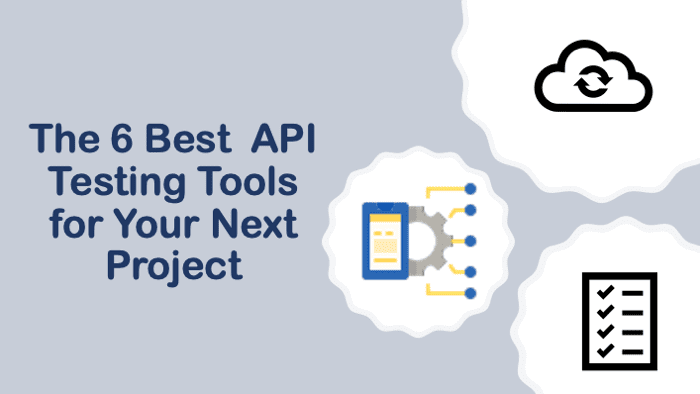Table of Contents
ToggleIntroduction
With the growth of cloud-based apps and platforms that are interconnected API testing became a necessity. A majority of the applications that we use every day depend on several interconnected API’s. If one of them isn’t functioning well, the entire service could be affected. There are a variety of API testing tools available on the market to aid us in making sure that everything is running smoothly. This article highlights the six best API testing tools, however first, we’ll explain exactly what the definition of an API is and what is api testing and its advantages.
What is an API?
APIs (Application Programming Interfaces) let applications communicate with each using specific rules and guidelines. They are accountable for defining the kinds of requests an application may send to another, and for defining the next three factors that include:
- How to process these requests
- The format of data
- The specific rules the user has to follow.
Through APIs, any application that is connected to the internet could transmit the request through a web server and in turn the server will read your request, and then interpret the data. Once the required actions have been performed, it will send an answer to the user interface, containing information.
What is API Testing?
API testing is a process that examines how APIs were designed. It evaluates whether APIs meet their intended purpose to ensure that the performance and reliability, security and performance aren’t affected. Furthermore, API testing involves testing SOAP web services , or REST APIs employing JSON and XML message payloads that are transmitted via HTTPS, HTTP, MQ as well as JMS.
Rest API testing tools permit testers to test a variety of aspects such as:
- If an API returns the expected response correctly formatted.
- If it responds appropriately to extreme cases (e.g. failings, failures or unanticipated inputs).
- How well it is able to respond to security threats.
- The amount of time required to respond.
The most effective API testing tools
Apigee
Apigee is an extremely intriguing cross-cloud API testing tool powered by JavaScript that permits developers and testers to use its functions through different editors.
This tool can be used with APIs that hold huge amounts of information which is perfect for large and complex digital enterprises. Additionally, it’s capable of quickly identifying problems that could be affecting performance by studying API traffic as well as response times and the possibility of errors. Furthermore, Apigee also enables the creation of proxies based on the Open API Specification.
Apigee offers a no-cost trial that allows you to take it for a ride before making any decision. After that, in order to continue using Apigee, testers and organisations must select the appropriate package. The packages currently available include Evaluation, Standard, Enterprise as well as Enterprise Plus.
Katalon
Katalon is a very popular testing tool that automates APIs, along with web-based applications, mobile and desktop applications. It can handle REST and SOAP requests, and offers a variety of options for parameterisation and commands. Katalon also follows an approach that is based on data. It allows integration with CI/CD and permits testers to conduct automated and exploratory tests.
One of the most significant advantages of this software it that, even with the many helpful features it provides it’s not too difficult to use, and is suitable for anyone who is not a tech expert.
Katalon provides a great and complete free program. Users can also select Studio Enterprise (76$/month), that includes more features as well as private plugins. For those who prefer you can also choose another option, the Runtime Engine package (54$/month) which allows tests to be run in pipelines of CI/CD, or via using the command line interface.
SoapUI
SoapUI is a rest api testing tool in software entirely focused on API testing which allows you to run tests on SOAP APIs as well as RESTful web services because it’s headless. It is one of the tools that is most often used by testers because it permits the creation of complicated scenarios, and also allows synchronous testing. It also is notable for its excellent test-driven data, and ease of using.
SoapUI provides two packages that are free, and one that is paid (the professional package). The free version is user-friendly testers are able to reuse scripts. In the Pro version it’s also possible to write custom codes and extract information (from databases excel spreadsheets, files, and files) and supports native integration with CI/CD.
Tricentis
Tricentis is among the best options for those looking to incorporate it in The Agile or DevOps Cycle. It is a model-based automation, which helps with maintenance of the script, and offers quick time to test regressions.
One of the main advantages is that it can support different protocols, like REST SOAP, HTTP(s) MQ JMS, NET TCP IBM MQ, and more. Another benefit is that Tricentis lets you test end-to-end for cross-browser, mobile, and packaged applications.
In terms of cost, it can vary in accordance with the specifications of the particular package.
Assertible
Testers and developers generally consider Assertible as among the best API testing tools, with an emphasis on reliability. It allows API tests in every stage that spans from continuous integration all the way to testing the pipeline for delivery.
Furthermore, Assertible provides users with extremely useful features. It is compatible to GitHub, Zapier, and Slack. Furthermore, Assertible also validates HTTP responses by using key assertions.
The API testing tool comes with three packages. The basic version is priced at 25$ per month, the starter plan is fifty dollars per month, and Business plans are the highest priced package (and one with more features) that costs 100dollars per month. Additionally, there’s an unpaid personal plan that allows you to conduct more easily API tests and getting a better understanding of the ways in which Assertible operates.
Postman
Although it was originally designed to be a plugin specifically for Google Chrome, Postman can also be used on Windows or Mac and is a fantastic tool to test API-related services, such as monitoring debugging, running requests, and so on.
For using Postman for api testing testers or developer doesn’t need additional language. It additionally supports different types of formats (such like Swagger or RAML). Furthermore, it provides integrated tools and workspaces, as well as collections and collections. Contrary similar to CURL, Postman is not an application that is that is based on command line, so testers and developers do not have to copy and paste your text directly into the command line.
Postman is a no-cost API to test API. If you want to avail additional features, it will cost 12 dollars per month per user.
Conclusion
When selecting the best API testing tool, it is crucial to think about what choices available could be better suited to certain functions. Sometimes, teams of developers and testers might decide to utilize multiple tools, because it is difficult to identify the most suitable and most effective tool. Therefore, teams must prioritize the “must-have” features they seek.
So, even though all the options mentioned in this article are of good reputation for quality, the most reliable API testing tool is the one that best meets the needs of an organization or project.
Got a question or just want to chat? Comment below or drop by our forums, where a bunch of the friendliest people you’ll ever run into will be happy to help you out!




